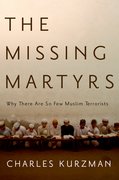Where are all the Islamic terrorists?
By Charles Kurzman
Last month, a few hours after a bomb exploded in downtown Oslo, I got a call from a journalist seeking comment. Why did Al Qaeda attack Norway? Why not a European country with a larger Muslim community, or a significant military presence in Muslim societies? I said I didn’t know.
A second media inquiry soon followed: Given NATO’s involvement in Afghanistan and Iraq, and the number of disaffected Muslims in Europe, why don’t we see more attacks like the one in Norway? This question was more up my alley. I recently













